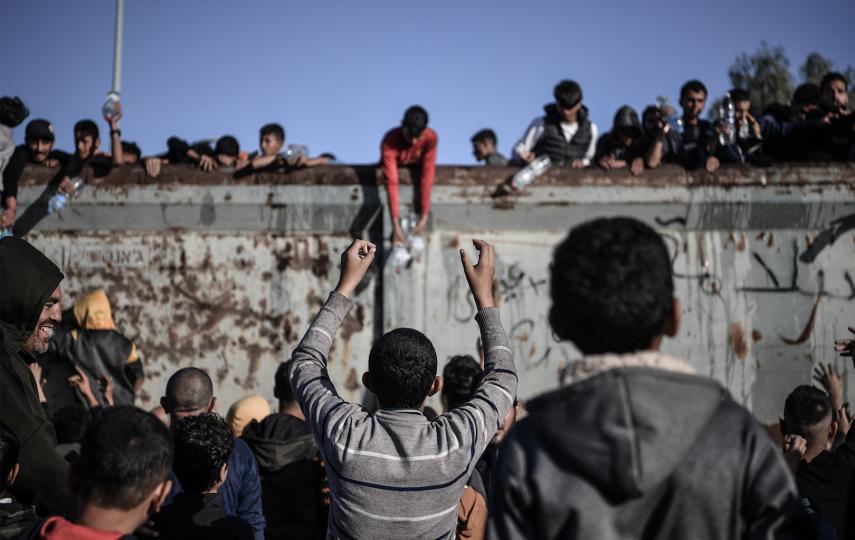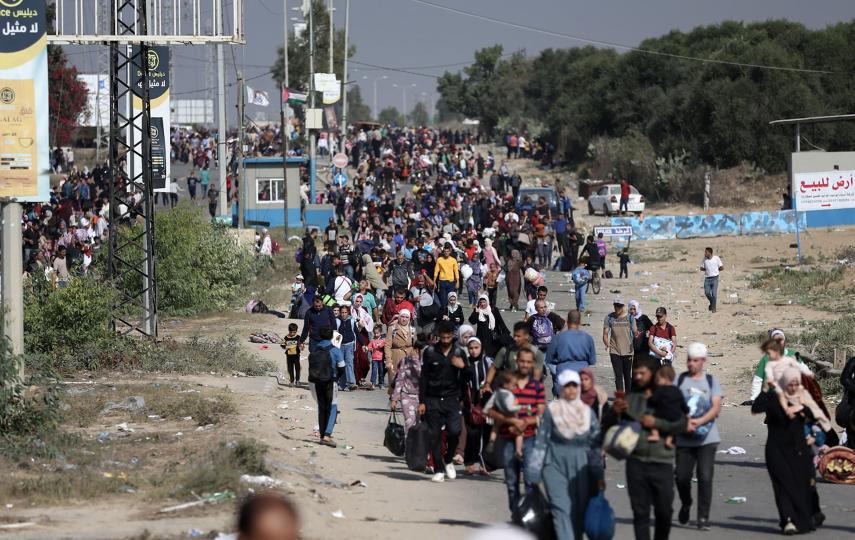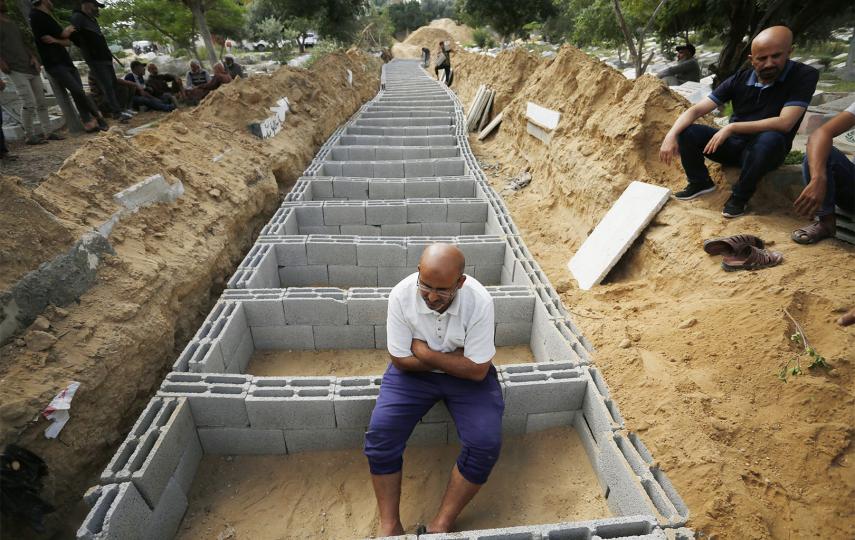The phrase ethnic cleansing carries moral weight. UN experts and human rights groups – sometimes even governments – use it to emphasise the graveness of atrocities being perpetrated against entire populations. But what does the term mean exactly, why isn’t it – legally speaking – a crime, and how can it be used to bring perpetrators to justice?
The New Humanitarian sat down with Clotilde Pégorier, the head of education at the Geneva Academy of International Law and Human Rights in Switzerland, who has conducted extensive research on the legal qualification of ethnic cleansing, to find out more.
International criminal law recognises four types of core crimes: war crimes; crimes against humanity; genocide; and the crime of aggression. The atrocities and abuses the term ethnic cleansing is used to describe can qualify as one of the core crimes, but not ethnic cleansing itself. “We have a legal loophole with this term,” Pégorier explained. “We don’t know what to do with it because it’s not a crime. We cannot prosecute.”
To name just a few recent examples, ethnic cleansing has been used to describe: Israel’s mass displacement of Palestinians in Gaza; the flight of nearly the entire ethnic Armenian population of Nagorno-Karabakh after Azerbaijan seized control of the contested enclave; the killing of civilians in Darfur in Sudan’s on-going civil war; and the Ethiopian military’s forced expulsion of people from the country’s Tigray region.
As well as covering the origins of the term, Pégorier also discusses correct usage, whether it should be classified as a crime in its own right, and how victims can push for justice despite the legal loophole. This interview has been edited for length and clarity.
The New Humanitarian: What is ethnic cleansing, and where does the term come from?
Pégorier: That is the most important question, actually. Even if you just Google the term, you don't really find any one definition of ethnic cleansing.
We have examples of ethnic cleansing going on throughout history. But the first time the term was really used was in the context of the former Yugoslavia conflict in the 1990s. The term is actually a literal translation of a Serbo-Croatian expression “etničko čišćenje”. It was used by the Serbian military commander before the Srebrenica massacre to describe what they were going to do to the population in Srebrenica.
Since the conflict in the former Yugoslavia, the term has been used fairly regularly. Sometimes it’s used instead of genocide; sometimes its used instead of crimes against humanity; sometimes it’s considered a war crime. So the concept lacks a clear definition, and we don’t have a full legal qualification of the term.
The New Humanitarian: So there is no definition that has been codified in a convention or established in case law?
Pégorier: We have a loose definition of ethnic cleansing in the report of the Commission of Experts that was formed by the UN Security Council in 1994 to investigate what was going on in the former Yugoslavia.
That definition said: “Ethnic cleansing means rendering an area ethnically homogeneous by using force or intimidation to remove persons of given groups from an area”, and it stated that ethnic cleansing “is contrary to international law”. There have been plenty of further attempts at definition but nothing that is legally binding.
The term has been used in certain UN resolutions and it has found its way into case law, but without a strict legal definition and often only in quotation marks, which is telling. International courts haven’t prosecuted anyone for ethnic cleansing.
The term is also mentioned in an overview document on the establishment of the International Criminal Court (ICC). The drafters of the ICC Statute said their aim was to punish and deter those who incite genocide or embark on a campaign of ethnic cleansing, murder, and rape, and who brutalise civilians. But again, ethnic cleansing hasn’t been defined as a legal term and isn’t punishable by the ICC.
The New Humanitarian: Ethnic cleansing is often mentioned in tandem with genocide. How are the terms related and what differentiates them?
Pégorier: Genocide is defined by the Genocide Convention of 1948. If you look at article two of the Genocide Convention and the Rome Statute of the ICC from 1998, it's exactly the same definition.
Genocide is a crime that has very limited conditions. It refers to the intent to destroy, in whole or in part, an ethnic, racial, national or religious group, as such. Only in cases that meet those criteria do you have the conditions of genocide. What’s extremely difficult with genocide is, first, to define whether you have a particular group that is being targeted, and second, whether there is a genocidal intent to destroy. You definitely need this intent to destroy, and that can be difficult to prove in the court of law.
Ethnic cleansing does not require this same specific intent of physical destruction. That is the key distinction. Ethnic cleansing has more to do with the forcible removal of groups from a particular area or territory, without necessarily this intent to physically destroy. But, of course, it’s not always easy to make a clear distinction.
The New Humanitarian: Would it be useful if ethnic cleansing was classified as a specific crime apart from its current links to to genocide and crimes against humanity? And could you see this becoming a legal reality at some point?
Pégorier: I don't think it's going to become a legal reality in the near future. I'm just going to be honest. If you look at how long it took to decide on which crimes to include in the Rome Statute, I can’t see it being taken up any time soon. It's too political; It's too hard to come up with definitions of crimes.
But I would say, yes: I think it would be good to have ethnic cleansing classified as a specific crime apart from other recognised international crimes. I think this would help get rid of some of the confusion around the term and help to secure more effective accountability for acts that currently lie in this kind of grey zone of uncertainty.
I also think that a proper legal qualification, with the conditions properly defined, would go some way to stopping perpetrators of genocide hiding behind the language of ethnic cleansing as a supposedly lesser violation and to stop governments from doing the same to avoid the responsibility to intervene. A proper qualification of ethnic cleansing as an international crime, of equal status to other international crimes, would be helpful in these regards.
The New Humanitarian: Multiple UN experts and human rights defenders have said that there is a danger of the Israeli military ethnically cleansing Palestinians from parts or all of Gaza. In your view, is what we are seeing in Gaza ethnic cleansing?
Pégorier: I can say yes in terms of the atrocities being perpetrated there. But as we don’t have a legal definition of ethnic cleansing, I think it may be counterproductive to say whether it is ethnic cleansing or not, in a legal sense at least.
In my opinion, it is best to call the atrocities what they actually are in law, instead of labelling them under this umbrella term of ethnic cleansing. But maybe things will change now with South Africa bringing Israel to the International Court of Justice (ICJ) on charges of genocide. Maybe the question of ethnic cleansing, its definition and status, might be addressed again, and we might move towards a better understanding of the crime.
The New Humanitarian: Are there international crimes that are already defined that could be used to prosecute perpetrators for the acts experts and human rights advocates are referring to when they say ethnic cleansing is taking place?
Pégorier: Forcibly removing a group, that’s part of genocide, but it would need to be with the intent to destroy the members of the group, and it would need to be a specific group. It can also be classified as the war crime of forced displacement of a population or deportation. Deportation is also a crime against humanity.
So all of these elements that are seen as being part of ethnic cleansing can all be part of these other international crimes. That’s why it’s important to know what the conditions of the crimes are to identify whether what is happening constitutes a war crime, a crime against humanity, or genocide.
The New Humanitarian: Why do UN experts and human rights defenders use the term if it isn’t classified as a crime?
Pégorier: Is it easier to say it's ethnic cleansing instead of specifying everything that is going on? Does it take less words on the page? Is it a kind of shorthand that captures much of the violence being done? I really don’t know. Does it make it easier for people to understand what is happening?
It seems to be used as a kind of umbrella term. People use it when something is going on but we perhaps don’t know how, exactly, to qualify it. We don’t know if we should call it a genocide or if we should call it a war crime or if we should call it crimes against humanity. It’s perhaps a convenient label in this sense. We know that the population, the civilians, are being brutally attacked, that we have sexual violence, but because we don’t know how to qualify it, let’s just call it ethnic cleansing.
I think it’s a term that carries weight, and I think it's a good way to raise awareness and cause alarm that something is going on here. In South Sudan, human rights groups are saying that there’s evidence of ethnic cleansing; there is sexual and gender-based violence and forced disappearances. Those are atrocities on their own. Sexual violence, if you want to prosecute, can constitute a war crime, crime against humanity, or be a constitutive act of genocide.
It’s okay to use the term ethnic cleansing descriptively, if you don’t want to prosecute. But if you want to go further and you want to apply criminal law, you need to be more specific and you cannot use ethnic cleansing because you cannot go in front of the ICC or even the ICJ and say it’s ethnic cleansing, because it is not a crime. But in other contexts to demonstrate that atrocities are going on, violations are going on, maybe it is okay to use, though there is perhaps a responsibility to make sure the term is used accurately and not as a catch-all term.
The New Humanitarian: Since ethnic cleansing is not a crime in its own right, what avenues, if any, do people who have been subjected to ethnic cleansing have to push for justice and accountability?
Pégorier: If you go back to the Commission of Experts’ report for the former Yugoslavia, it said that ethnic cleansing is contrary to international law. So the international community should do everything in its power to prevent this kind of forcible removal of a population or of a group from a specific territory. But that’s all that can be done. We cannot put a state or group or individual in court for ethnic cleansing because it is not a crime. All we can do is say that is what is happening, and it should not be happening.
For accountability or justice, you need to bring ethnic cleansing under the definition of another international crime. Either you need to escalate it to genocide, if it meets the criteria of it being a genocide, or bring it under the ambit of war crimes, if it happened during wartime and a population is being forcibly removed from a territory. But again, whichever route is taken, we need to make sure the precise conditions of the relevant crime are fulfilled.
Edited by Andrew Gully.






